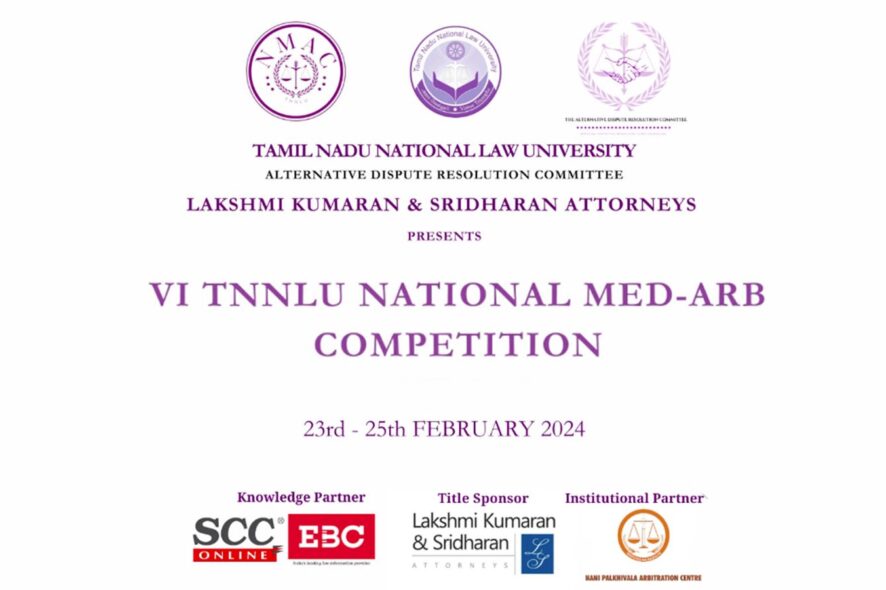Welcome to the Temple city of Tamil Nadu, Tiruchirappalli!
In pursuance of its goal of conditioning law students to efficiently resolve disputes, the Tamil Nadu National Law University through its Alternative Dispute Resolution Committee (ADRC) cordially invites law students from across the country to participate in its 6th National Med-Arb Competition to be held in offline mode from 23rd February 2024 to 25th February 2024. This distinct hybrid of Alternative Dispute Resolution mechanisms aims to nurture the future members of the Indian legal fraternity by enabling them to face the dynamic Indian Justice System.
Moreover, Tamil Nadu National Law University is the first law university in India to conduct a competition on the Med-Arb model of dispute resolution. The Med-Arb competition involves a two-step dispute resolution process in which parties attempt to resolve their dispute in mediation, and, if they fail to resolve some or all of their issues, the remaining issues are automatically submitted to arbitration where the arbitrator imposes a binding decision. The competition included a unique element of arbitral award writing which is prepared by the arbitrator/mediator after the oral submissions of both the parties in the arbitration session. TNNLU is the first among all the Universities in the country to organize such a competition on arbitral award writing.
With 20 teams from leading law universities participating in the event, this competition promises an exciting showcase of Mediation and Arbitration Skills.
23rd February, 2024 (Day 1)-
3:30 PM | Registration | Multi-Purpose Hall
The event commenced with the registration process, signaling the start of a stimulating gathering for all participants. As they entered, they were greeted warmly by the Organizing Committee, radiating smiles and offering words of encouragement, thereby fostering a welcoming environment. With registration concluded, it became evident that the event was set to unite a varied and vibrant assembly of law students from across India, all poised to play their part in the competition’s success.
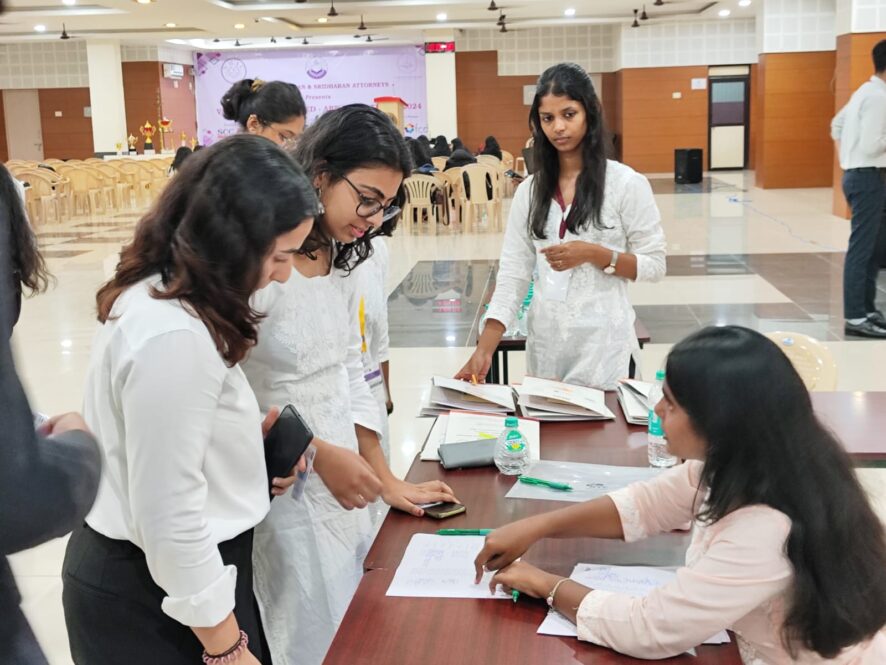
5 PM | SCC Online training session | Multi-Purpose Hall
At 5:00 PM, a training session conducted by the Campus Ambassador of SCC Online and Eastern Book Company for TNNLU commenced in the Multi-Purpose Hall. The session commenced with a brief introduction about himself, SCC Online, and the history of Eastern Book Company. Moving forward, the ambassador provided participants with an extensive overview of how SCC Online can be effectively utilized, using the appropriate keywords. Force majeure, Termination, and COVID were recognized as three important keywords that were taken from the proposition.
He demonstrated how one can find case laws on force majeure by navigating through the SCC Online platform, beginning with browsing articles from the home screen, selecting the Indian Contract Act, proceeding to Section 56 of the Indian Contract Act, and further refining the search results by utilizing specific examples such as of COVID-19.
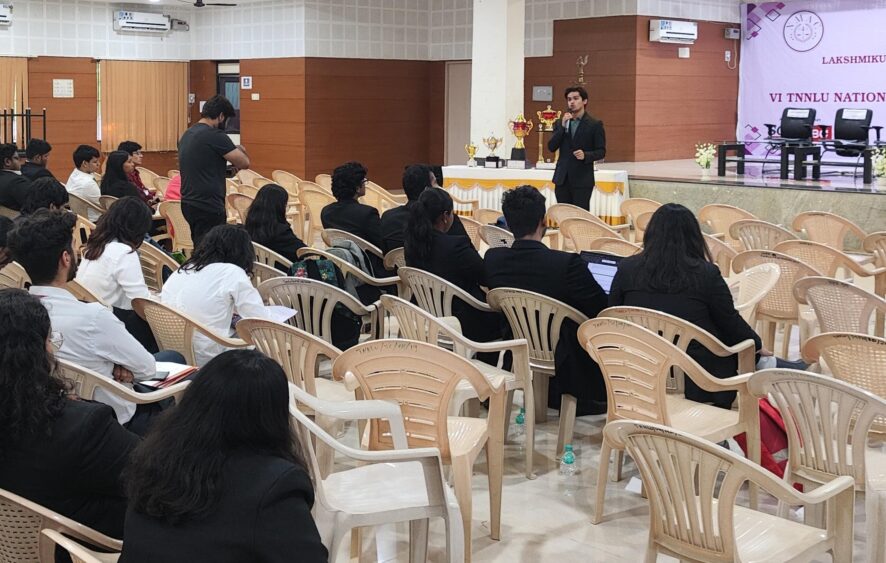
Following this, the utility of the Browse Curated Topic option was elucidated, demonstrating its significance and the abundance of available articles on various subjects. Subsequently, the ambassador demonstrated the functionality of the word search option, elucidating how Boolean search operators such as AND, OR, and NEAR can be employed to obtain precise results, exemplified by a search query of “Force majeure” AND “Doctrine of Frustration”.
At 5:20 PM, attention shifted towards the EBC Reader, highlighting its versatility beyond mere access to books, particularly in aiding research endeavors for law students. The utility and advantages of the EBC Reader for students were underscored, using Avtar Singh’s book on Indian Contracts, focusing on the Doctrine of Frustration and Force majeure in the context of COVID-19.
Moreover, emphasis was placed on the significance of the advanced search tool within the EBC Reader, including the search within search feature, to effectively refine search results according to the participants’ requirements.
The session concluded at 5:30 PM with closing remarks delivered by Anish Mishra, expressing gratitude to all participants on behalf of EBC Reader and SCC Online. Furthermore, participants were informed about the opportunity to engage further with the event’s proceedings through the Live Blogging Section of SCC Online Times.
5:30 PM | Inaugratration Ceremony | Multi-Purpose Hall
As the VI TNNLU National Med-Arb Competition kicks off at Tamil Nadu National Law University, the ADR committee members are shedding light on the essence of mediation and arbitration. This serves as an inspiring platform for legal minds, fostering a vibrant academic journey. Gratitude is extended to the attorneys at Lakshmikumaran and Sridharan, along with the Alternative Dispute Resolution Committee, for their pivotal role.
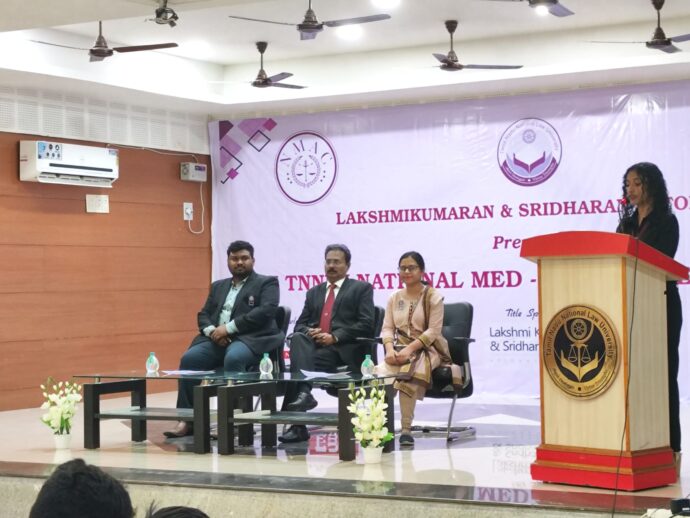
With the resonating chords of the Tamil Thai Valthu (the State anthem of Tamil Nadu), everyone stands in respect. The Registrar of TNNLU, Prof.(Dr.) S.M. Balakrishnan, faculty in charge, Ms. Mrinmoyee Mukherjee and Mr. Vasishtan P., and Assistant Professor of Political Science, Dr. S. Subba Rao collectively ignite the ceremonial lamp, marking a significant moment in the competition’s journey.
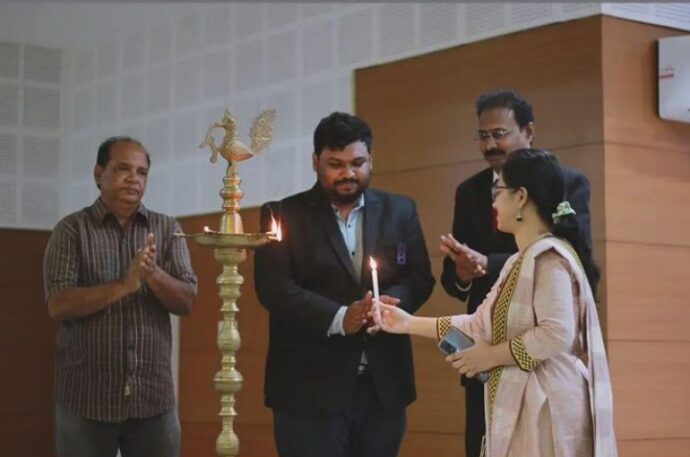
Mr. Vasishtan P. takes the stage, delving into the evolution and functioning of alternative dispute resolution. From client counseling to mediation and arbitration, each facet is explored. References are made to past endeavors like the Louis M. Brown & Forrest S. Mosten Client Consultation Competition (India Rounds), previously hosted by Tamil Nadu National Law University, highlighting the potential and mechanisms of ADR.
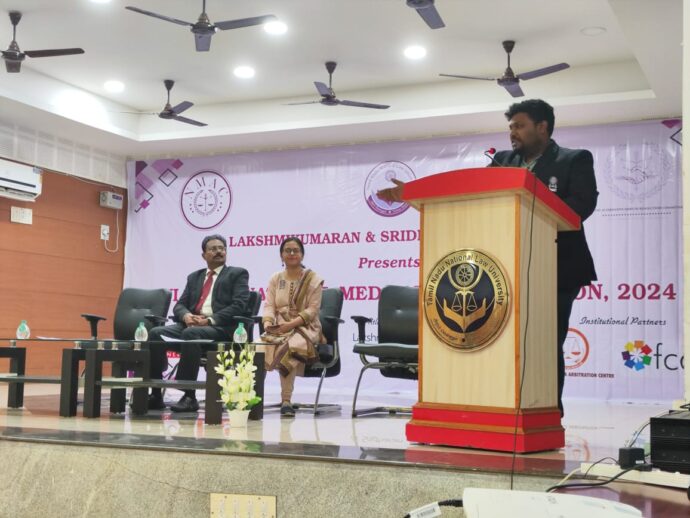
Moving forward, Prof. (Dr.) S.M. Balakrishnan steps up to address the participants, expressing gratitude for the opportunity. Encouragement fills the room as participants are urged to give their best, with a hopeful wish for the best team to emerge victorious. Insights into the Arbitration and Conciliation Act, along with significant cases, enrich the discourse.
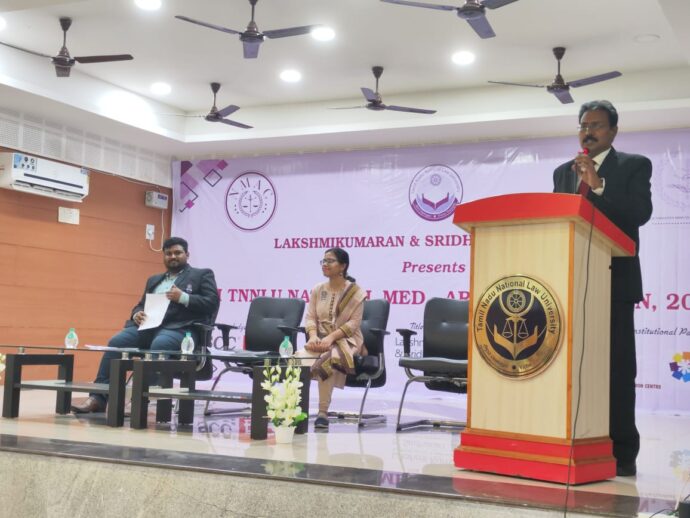
As the event unfolds, gratitude is extended to all supporters, including SCC Online and Eastern Book Company as the Knowledge Partner, Nani Palkhivala Arbitration Centre as the Institutional Partner, and Lakshmikumaran and Sridharan Attorneys as the Title Sponsor of the event.
The participants were briefed on the scoring criteria, encompassing all relevant rules and regulations. Detailed instructions were provided regarding the semifinal and final rounds, with arbitration accounting for 60% of the marks and mediation for the remaining portion. Additionally, participants were apprised of TNNLU’s equity policy and were informed about the committee members available for any queries or doubts.
Ramsha, a Senior Member of TNNLU’s ADR, initiated the participant briefing promptly at 6:45 PM. She delivered comprehensive instructions regarding the marking criteria for the upcoming competition, outlining the rules and guidelines governing both the mediatory phase and the arbitration proceedings. Special emphasis was placed on the importance of the proposition and memorial. The session concluded at 7 PM after Ramsha provided details on the grievance redressal procedure for the participants.
The formal and structured briefing ensured that all participants were well-informed and prepared for the competition ahead.
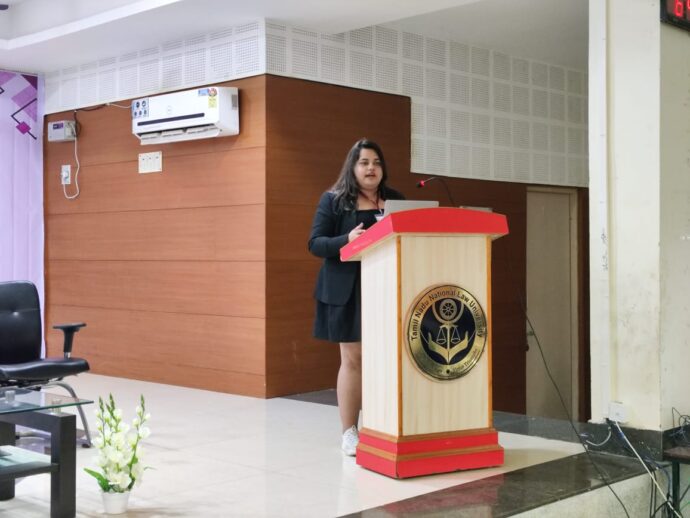
Following the informative sessions, the fixtures for the Preliminary Rounds were determined through a meticulous process facilitated by Ms. Dheekshanya, a Senior Member of TNNLU’s ADR, with the assistance of Ms. Leah, and Ms. Shreya P. from the Organizing Committee. Ms. Dheekshanya meticulously explained the process of team allocation for the rounds and promptly solved participants’ queries too. Each step was carefully outlined, ensuring transparency and fairness in the allocation process. The involvement of esteemed members of the Organizing Committee further added credibility to the procedure.
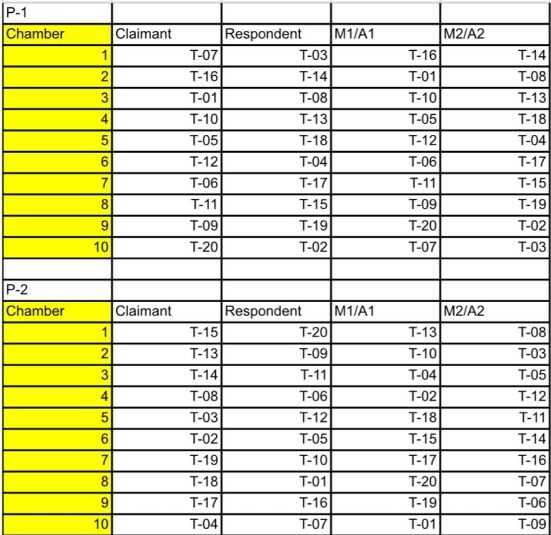
This marks the end of Day 1! As we transition into Day 2, both participants and the organizing committee anticipate a day filled with challenges and opportunities. We extend our best wishes for the seamless execution of the day’s activities.
24th February, 2024 (Day-2)-
10:30 AM | Preliminary Rounds | UG Block
Preliminary Round-1
MEDIATION
Court Hall-I-
The rounds commence at 10:35, with Mr. Gautham Balaji and Ms. Apoorva Vinjamur presiding as judges. Formalities, including the confirmation of team codes, are concluded, officially initiating the proceedings at 10:41. The mediators extend a cordial welcome to the teams, expressing gratitude for opting for mediation and ensuring confidentiality throughout the process. Clients and counsels from both parties introduce themselves, with the counsels affirming their commitment to act in the best interests of their clients. They elucidate their roles and discuss the extent of their authority while representing their respective clients.
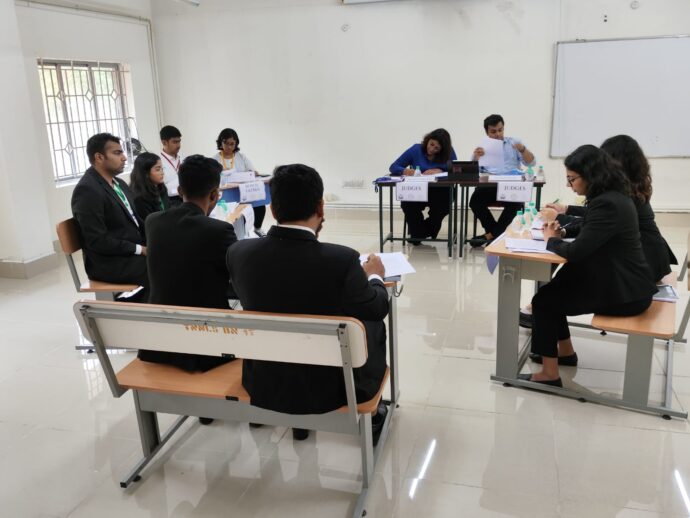
The responding party evokes nostalgia, reflecting on earlier encounters and expressing remorse for the challenges encountered, including the personal tragedy experienced by the requesting party. Counsels engage in thorough discussions to grasp the nuances of the matter and consider the suggestions put forth by the opposing party, along with available mechanisms for rectification.
Court Hall-II
The proceedings commence at 10:42. Presiding over the session are Ms. Saloni Borse and Ms. Shradha Pandey. The mediator initiates by extending a formal welcome to the parties, affirming the confidentiality of the session and underscoring their credentials to reassure the participants. Both parties exchange their credentials and identities, with counsel clarifying their advisory role and emphasizing that decision-making authority lies solely with the clients.
The claimant’s opening statement delineates the issue at hand, with their counsel expounding on the legal aspects of the case. The claimant seeks to achieve consensus and mutual collaboration for the benefit of both parties. The respondent’s opening statement elucidates the rationale behind their actions, the losses incurred, and their anticipated outcome from the mediation. The respondent’s counsel unequivocally states their client’s stance of not assuming liability for any damages.
Agendas are established by the parties before discussions. Each party presents their perspective on the agenda items, with respective counsels diligently advocating for their clients within the framework of the law.
Court Hall-III
The round took place under the esteemed presence of the judges Ms. Shweta P. Iyer and Ms. Shruthikka.
The round began with a greeting from the mediators and then introducing themselves after that the mediators meticulously explained the rules and regulations of the competition to both parties ensuring that the environment during the mediation session remains friendly the session helpful and make it advantageous for both the parties by reaching an amicable agreement.
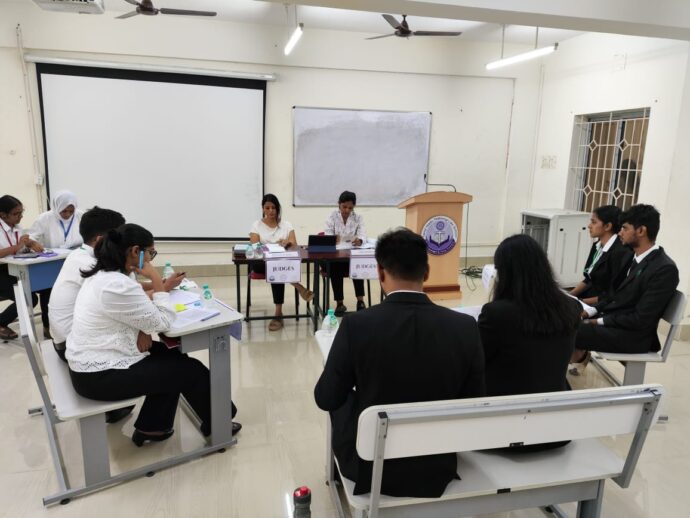
The requesting party Krishna starts with his opening statement and persuasively highlights the losses that he suffered because of the accident to the mediators. The counsel laid down the arguments of the requesting party by highlighting the technicalities and legalities involved.
The client of the responding party also thanks the requesting party and reiterates his problems followed by the counsel meticulously highlighting the position of the responding party and their demands.
The session transpired with both parties trying to persuade each other to give in to their demands while trying to reach a consensus, which led to a heated exchange of arguments between both parties. The mediators, who were actively listening to the arguments of both the parties understood the demands and the case of both the parties, asked questions to both the parties, and laid down a roadmap for both the parties to reach an agreement that would be beneficial for both the parties. Both parties agreed on some points but couldn’t agree on some.
The session ended with the closing statement from both parties and laying down the roadmap for further mediation sessions along with an exchange of thanks for making time to be a part of the mediation session. After the session, the judges asked several questions from the parties and the mediators.
Court Hall-IV
As the mediation session commenced. The mediators initiated the proceedings by introducing themselves and expressing gratitude to both parties. They then invited the parties to introduce themselves and their respective counsels.
Emphasizing the importance of maintaining equality between the parties, the mediators underscored their neutral role and the confidentiality of the discussions. They clarified that while they don’t offer legal advice, they aim to facilitate a fair and constructive dialogue.
Turning to the requesting party for their opening statement, they highlighted the economic challenges exacerbated by the COVID-19 pandemic, particularly before reaching an agreement with the responding party. They expressed hope for a consensus through mediation, citing a lack of transparency and communication during the pandemic as key issues to address. Their primary agenda is to understand the root cause of these communication breakdowns.
In response, the representatives of the responding party expressed appreciation for the opportunity to engage in mediation. They acknowledged the unavoidable challenges posed by the pandemic and outlined their reasons for opting for mediation. Despite having explored legal avenues, they emphasized their commitment to finding a solution and avoiding a blame game. Their focus remains on resolving the dispute through collaborative efforts.
Court Hall-VI
The proceedings commence promptly at 10:50, presided over by esteemed judges Mr. Krishna Kumar and Mr. Arjun Saravanan. Following the informal confirmation of team and mediator details, the session begins with a gracious welcome from the mediators, who elucidate the mediation process and underscore the importance of confidentiality.
As the discussion progresses, counsels diligently advocate for their client’s best interests, engaging in thorough deliberations. They provide comprehensive summaries, outlining the issues faced by their clients and offering valuable legal insights to attain optimal outcomes.
With 20 minutes remaining, a caucus is convened, during which confidential information is utilized. The responding party proposes a request for 45% of the revenue profit upon completion of the construction, building upon previous negotiations. In response, the requesting party offers 22% of the revenue, with the mediators clarifying the nature of the construction, whether domestic or commercial. Despite efforts, a middle ground cannot be reached, prompting both parties to agree to reconvene for another session.
The commitment to further dialogue underscores the dedication of all parties involved to reach an equitable resolution.
Court Hall-VII
The honorable judges presiding over the mediation session are Mr. Kiran Manohar and Mr. Natheniel Andrews. Following the setting and confirmation of agendas by the mediators, both the requesting party and the responding party articulate their perspectives on the agenda items. This exchange proceeds smoothly, devoid of dispute or impediment.
The requesting party expresses a keen interest in future collaboration, proposing a partnership ratio of 60% for the respondent and 40% for themselves. It is stipulated that this collaboration would involve a cash transaction, as outlined by the counsel of the requesting party. The rationale behind this proposal is to acquire land and expand their business operations. The cash component is proposed to constitute 45% of the total amount.
During the mediation, both parties articulate the emotional and financial losses incurred as a result of the dispute.
Regrettably, the mediation concludes without the provision of compensation from the respondent to the requesting party. Despite this outcome, both parties extend gratitude to one another for dedicating time to participate in the session.
The conclusion of the mediation session underscores the importance of dialogue and cooperation in resolving disputes amicably.
Court Hall-VIII
The round took place under the esteemed presence of the judges Ms. Deepika Sivakumar and Ms. Lydia Steffi.
The round began with a greeting from the mediators and then introducing themselves after that the mediators meticulously explained the rules and regulations of the competition to both parties ensuring that the environment during the mediation session remains friendly the session is helpful is advantageous for both parties by reaching an amicable agreement.
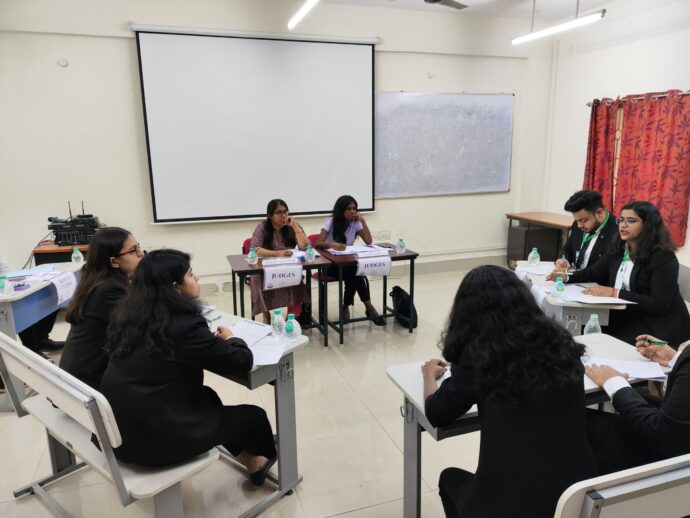
The client started with meticulously highlighting his position in the case followed by the counsel laying their agenda for the session along with the technicalities and legalities involved. The client from the responding party also highlighted their problems and position on the issue followed by the arguments of the counsel along with the technicalities involved.
Both parties further had a heated argument over the issues involved in the mediation process, along with a persuasive attempt from both parties to reach a consensus with each other.
The mediators actively listened to both parties made an attempt to persuade each party individually and laid down the guidelines for both parties that would be beneficial for both the parties, and helped the parties to reach an agreement on some issues and lay the agendas for mediation in the further sessions of mediations.
The session concluded with both parties giving their closing statement exchanging greetings and appreciating each other for making time to attend the mediation session. After the mediation session, the judges asked several questions from the teams and the mediators.
Court Hall-X
During the mediation session, the mediator invited both parties to present their agendas. The responding party expressed optimism about reaching an amicable resolution through mediation. Each party then delivered their opening statements, detailing their concerns.
The mediator summarized the key points raised, highlighting the significance of the startup culture and the connectivity of Trichy city as emphasized by the requesting party. Proposals were made, with the responding party offering a counterproposal, while the requesting party presented a cross offer, specifying the proportions of residential and commercial buildings.
The mediator briefly explained the terms of the offers. The responding party agreed to the initial offer, but the requesting party proposed an additional advance amount due to their incurred losses. They also requested exclusivity rights for property development, which the responding party initially agreed to, contingent upon a loan agreement. However, the requesting party later expressed hesitation regarding the exclusivity clause.
Throughout the dialogue, both parties exchanged their concerns and engaged in discussions. The judges also participated, posing questions to clarify aspects of the situation
ARBITRATION
Court Hall-I
The Arbitrators graciously extend a warm welcome to the parties involved in the arbitration proceedings. Presiding over the session are esteemed judges Mr. Gautham Balaji and Ms. Apoorva Vinjamur.
During the proceedings, the parties candidly discuss the challenges they have encountered due to the circumstances that have arisen. The responding party, in particular, highlights what they perceive as factual inaccuracies in the written submissions and asserts their disregard for the time constraints outlined in the agreement. They emphasize the unforeseen and unprecedented nature of the “Covid-19” pandemic, invoking the defense of “force majeure”. The responding party presents notifications from government organizations in support of their claim, citing the spread of coronavirus as an unanticipated event that absolves them from any liability.
Following the presentation of arguments by the responding party, the requesting party offers rebuttals to address the points raised. The judges then proceed with their line of questioning, focusing on issues related to termination.
The formal and structured nature of the arbitration proceedings underscores the importance of thorough deliberation and adherence to legal principles in resolving disputes.
Court Hall-II
The arguments presented by the claimant centered on the principle of transparency and how the lack thereof resulted in the sabotage of the contract. Further emphasis was placed on the significance of notice and its role in causing damage to the claimant.
In response, the respondent defended their position by invoking the doctrine of frustration, particularly in the context of force majeure. The respondent’s arguments were firmly supported by the Indian Contract Act of 1872.
During the proceedings, the arbitrator raised inquiries regarding the impact of the COVID-19 pandemic on the actions and communications of the parties. The response provided by the respondent was deemed unsatisfactory by the arbitrator, necessitating further clarification.
The respondent demonstrated a profound understanding of the matter through the adept use of case laws and factual evidence. The central focus of the arguments revolved around the lack of communication between the parties, coupled with the absence of notice and the application of the doctrine of force majeure, which purportedly rendered the contract frustrated.
The formal exchange of arguments highlighted the complexity of the legal principles at play and underscored the necessity for thorough analysis and elucidation in resolving the dispute.
Court Hall-III
The arbitration sessions commenced at 12:15 with a warm welcome extended by the arbitrators, in the esteemed presence of judges Ms. Shweta P. Iyer and Ms. Shruthikka.
The proceedings commenced with the requesting party presenting their arguments, focusing particularly on jurisdiction. The counsel for the requesting party meticulously and persuasively articulated their client’s position, highlighting the challenges faced during the COVID-19 pandemic and the changed stance of the responding party. These arguments were supported by various statutes and case laws, with particular emphasis placed on the doctrines of frustration and force majeure and their applicability to the case at hand.
Following the presentation of arguments by both parties, the arbitrators posed questions to clarify and probe further into the arguments presented. Subsequently, the parties engaged in rebuttals and surrebuttals, effectively refuting each other’s claims with the aid of statutes and case laws.
The arbitration proceedings concluded with questions from the judges, followed by feedback provided to both teams. The judges offered guidance on areas where improvements could be made, drawing upon the intricacies of both mediation and arbitration processes.
The formal and structured nature of the proceedings ensured a thorough examination of the arguments presented, contributing to a fair and impartial resolution of the dispute.
Court Hall-V
The arbitrators have formally introduced themselves, emphasizing the importance of adhering to the rules and regulations outlined in the Arbitration and Conciliation Act. They have allocated time limits among themselves for the proceedings.
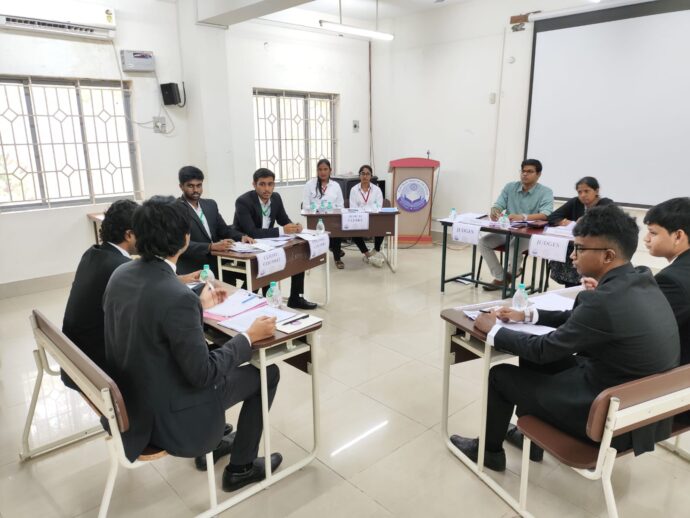
The counsel representing the claimant has taken the floor, presenting their arguments. They have highlighted two crucial issues and elaborated on them in detail. The counsel has asserted that the opposing party is accountable for breaching the contract and has invoked the doctrine of force majeure due to the impact of COVID-19. Additionally, they have cited clauses from the JD Act and raised concerns supported by Section 73 of the Contract Act.
Furthermore, the co-counsel has added to the discussion, stressing that the excuse of COVID-19 does not absolve responsibility, as it was the claimant’s error. Finally, the council has outlined their demands for compensation, bolstering their stance with references to relevant case laws.
Court Hall-VI
The Arbitrators extend a cordial welcome to all parties involved in the arbitration process. Presiding over the proceedings are esteemed judges Mr. Arjun Sarvanan and Mr. Krishna Kumar.
During the initial phase, the parties apprise the arbitrators of the issues that prompted them to initiate legal action against each other. The arbitrators inquire about both parties’ oral and written submissions, seeking clarification and understanding.
Subsequently, the floor is opened to both teams, allowing them to raise rebuttals on each other’s submissions and request clarifications as necessary. The counsels for both teams draw attention to relevant precedents, directing the judges’ focus towards them to support their arguments.
Following the presentations and exchanges between the parties, the judges offer insightful feedback to the arbitrators and mediators, delineating the distinction between the two roles. They underscore the importance of understanding the varying responsibilities and emphasize that the arbitrators’ role is to facilitate resolution rather than to advocate for a specific outcome.
Furthermore, the judges highlight the mistakes made by both teams and stress the significance of adhering to proper etiquette and roles. They emphasize that counsels should advise and present offers rather than rigidly adhering to one position, as this approach undermines the effectiveness of the arbitration process.
The feedback provided by the judges serves to enhance the understanding of all participants and reinforces the principles of fairness and equity within the arbitration process.
Court Hall-VII
The proceedings commenced at 12:13 PM, initiating a thorough discussion on the jurisdiction of the arbitration. The issues presented by the claimant, which are to be resolved within this arbitration, were subsequently raised. Considerable attention was given to the concept of force majeure, with extensive discussions revolving around its applicability supported by legal precedents.
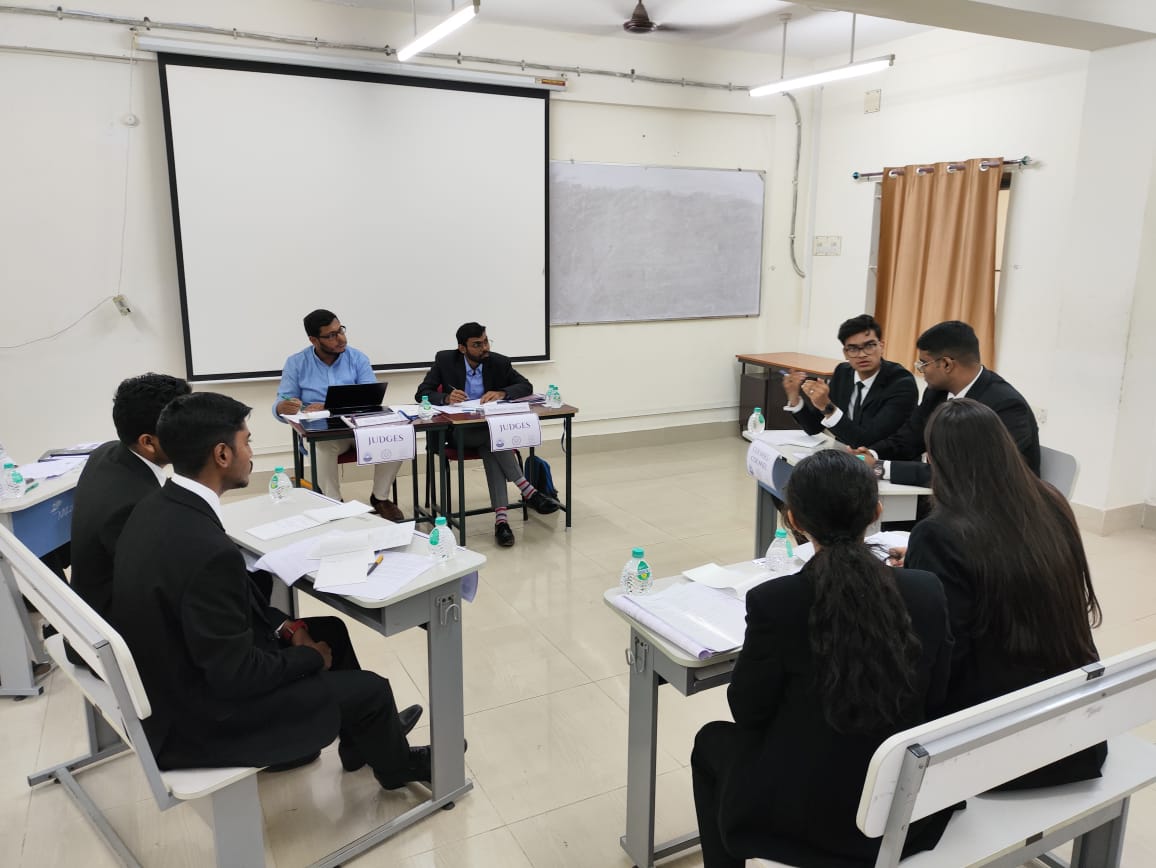
The claimant underscored arguments regarding the impossibility of the act, shedding light on the implications of the ban order and its impact on said impossibility. The failure to provide notice was substantiated by robust evidence derived from pertinent facts and legal statutes. The primary legislative framework invoked by the council was the Indian Contract Act of 1872.
The formal discourse delved into complex legal principles, emphasizing the necessity for meticulous consideration and application of relevant laws and precedents.
Court Hall-VIII
The arbitration sessions commenced at 12:15 PM with a gracious welcome from the arbitrators. The proceedings transpired in the esteemed presence of judges, Ms. Deepika Sivakumar and Ms. Lydia Steffi. The issue that led the parties to arbitration was presented before the arbitrators.
Both parties articulated their arguments meticulously and persuasively, supported by a solid foundation of statutes and case laws. A significant portion of the arguments from both sides centered around the impact of COVID-19 as a force majeure, along with the applicability of the doctrine of frustration in the case at hand. Additionally, the failure to provide notice was discussed extensively by counsels from both sides, with ample reference to relevant case laws.
The arbitrators actively listened to the arguments presented and posed several questions to counsels representing both parties. Following the initial arguments, the parties proceeded to rebut each other’s claims, employing various case laws from their written submissions to effectively counter the arguments of the opposing party.
Subsequently, the proceedings transitioned to the surrebuttal phase, during which the claiming parties effectively addressed the contentions raised by the petitioners. The session concluded with probing questions from the judges for both parties, with a focus on the utilization of case laws to elucidate various concepts presented in the written submissions.
Feedback was provided to both parties and the arbitrators on their performance, highlighting areas of strength and areas for improvement.
Court Hall-X
The claimant side has concluded their arguments, concluding with their prayer for relief. Now, the respondent side has commenced presenting their contentions. Numerous questions are being directed to both counsels representing the respondent side. They have referenced various Indian and English case laws to support their points.
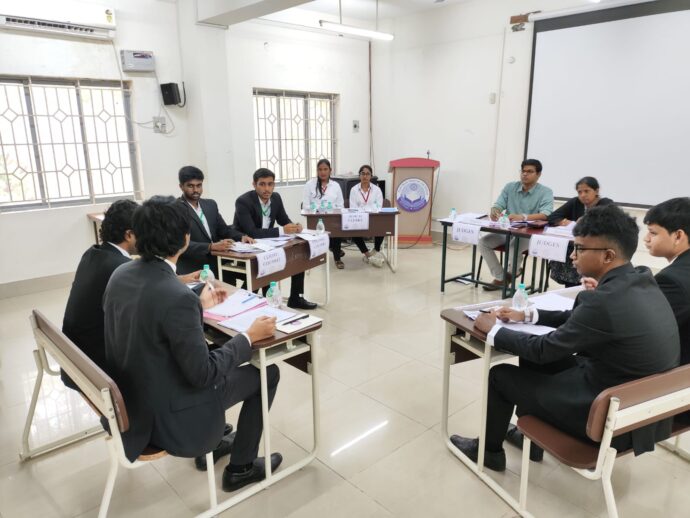
The counsel from the respondent side has articulated their second issue regarding force majeure. Additionally, they highlighted a judgment from the Madras High Court that prohibits a significant increase in the price of goods. Subsequently, the co-counsel began presenting their contention, asserting that the question of breach is not applicable in this specific scenario, contrary to what was argued by the claimant’s counsel.
The claimant side reiterated their stance that the failure in communication from the respondent’s side has contributed to the current situation. As the proceedings progressed, both arbitrators engaged in questioning both the claimant and respondent sides, seeking further clarification and insights.
1:30 AM |Arbitral Award Writing | Library’s Language Lab
Following the successful conclusion of both segments of Preliminary Round 1, participants assuming the role of Arbitrators were escorted to the Language Lab for the Arbitral Award Writing. As per the guidelines stipulated by the Arbitration and Conciliation Act, 1996 (Act), arbitrators are mandated to draft an award after each arbitration session. This task is assigned to participants registered as mediators/arbitrators following the oral submissions presented by both parties during the Arbitration Preliminary Rounds.
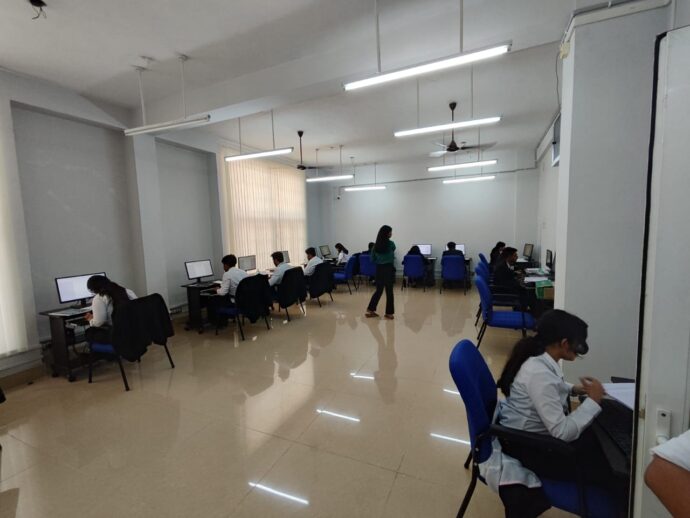
Preliminary Round-II|3:30 PM
Mediation-
Court Hall-I
The round commenced at 3:32 PM under the esteemed adjudication of Mr. Gautham Balaji and Ms. Apoorva Vinjamur. The requesting party presents themselves, with their legal counsel apprising all present of their authority and role as the legal advisor. Subsequently, the responding party introduces themselves, elucidating their authority and role in the case.
Following these introductions, the mediators introduce themselves, outlining the extent of their powers and responsibilities to the parties. They provide a comprehensive breakdown of the mediation process.
The requesting party delineates the vision behind the land originally acquired by their parents, highlighting the issue of communication lapse from Karpanai Developers P Ltd, resulting in losses for both parties involved. The legal counsel elucidates their advisory role and powers.
In response, the responding party expresses regret over the matter and demonstrates willingness to negotiate an agreement to preserve their relationship. The clients engage in discussions regarding the nuances of construction, seeking to understand each other’s perspectives to reach the most optimal solution. The formal exchange underscores the commitment of all parties to achieve an equitable resolution through constructive dialogue and negotiation.
Court Hall-III
The mediation session took place under the esteemed presence of the judges Ms. Shweta P. Iyer and Ms. Shruthikka.
The session began at 3:30 PM with both the greetings from the arbitrators along with their introduction. Both the arbitrators laid down the rules and guidelines which have to be followed during the mediation session at the same time ensuring a friendly and amicable atmosphere by the parties during the session to ensure that the mediation session will be in benefit of both of parties.
The parties spoke about what brought them to this mediation session along with a brief introduction. Then both the parties mentioned their issues and demands from which the mediators derived three agendas that this mediation session will discuss. The counsel effectively persuaded the opposing parties to give in to each other’s demands.
The responding party came up with an innovative solution on a certain agenda which was liked by the requesting party and the mediators ensured that the parties agreed on it by further delving into the intricacies of the solution. Both the parties were quite amicable to each other and at the end, they agreed on several issues except for the issue of the compensation.
The mediators also played an important role in the session and persuaded each party to reach an agreement on the agendas. The session ended with the closing statement from both the parties and the arbitrators laying down the roadmap for further mediation sessions along with an exchange of thanks for making time to be a part of the mediation session. After the session, the judges asked several questions from the parties and the mediators.
Court Hall-IV
The counsels have allocated time among themselves to present their respective arguments. The claimant parties have emphasized the principle of equity, asserting their good faith in the matter, albeit hindered by inadequate communication. They have delved into the intricacies of the Indian Contract Act, specifically referencing Section 25, and bolstered their position with various case laws.
In response, the arbitrators have posed inquiries to the claimant parties, seeking further clarity. The claimant party has adamantly stated their entitlement to damages, attributing the breach of contract to the respondents. Their argument culminated with a formal prayer. On the other hand, the respondent side has countered by alleging a violation of Section 16 of the Arbitration and Conciliation Act and has brought forth Section 4 of the same act. However, arbitrators have noted attempts by the co-counsel to stray from the central issue.
Furthermore, the respondent has cited a relevant case law involving the National Highways Authority of India (NHAI) to fortify their stance. They have argued against categorizing the pandemic as a force majeure event. As the proceedings unfold, both parties are engaged in a rigorous exchange of legal arguments and interpretations, while the arbitrators diligently ensure adherence to the established framework of arbitration.
Court Hall-V
The second round commences promptly at 3:30 with a warm welcome extended to our esteemed judges, Ms. Poorvaja Raghupathy and Mr. Hari Krishnan, by all participants. The session initiates with the parties introducing themselves to one another, followed by the mediators outlining their roles, guidelines, and expectations for the forthcoming session.
The Requesting Party commences by reflecting upon the initial enthusiasm surrounding the signing of the Joint Development Agreement (JDA), which has since dissipated due to various reasons, notably the lack of transparency in communication. Expressing sorrow over the condition of their land, exacerbated by the passing of their parents, the petitioners expressed their desire to renegotiate the terms of the JDA, without making or accepting any offers.
In response, the counsel representing the respondent conveys condolences for the loss of Mr. Krishna’s parents and assures the petitioners of efforts to bridge communication gaps between Mr. Krishna and Karpanai Development P Ltd. Both parties reciprocate a willingness to engage in renegotiation.
The mediators, upon observing the mutual interest in resolving the issues faced by both parties, diligently facilitate the exchange of obstacles encountered. The counsel representing Karpanai Development P Ltd. suggests reducing the building to four stories by guidelines set forth by the government of Tamil Nadu. The petitioners scrutinize the feasibility of this suggestion in alignment with Mr. Krishna’s vision for the land. While the petitioners aim to maintain the 60-40 ratio outlined in the JDA, the respondents propose a shift to a 50-50 basis. The formal and structured dialogue underscores the commitment of all parties to finding a mutually acceptable resolution to the challenges at hand.
Court Hall-VI
The parties introduce themselves, with their respective counsels elaborating on the scope of their powers and responsibilities. Both parties articulate the challenges faced during the Covid-19 era. Subsequently, the parties present their respective terms, open for discussion and negotiation. A robust discourse ensues between the client/counsel pairs.
After thorough deliberation, a consensus is reached regarding the ownership of the disputed land. It is agreed that both parties will share 50% ownership of the land, and the nature of the buildings to be constructed is determined. Overall, the mediation agreement is characterized by its smooth and amicable resolution.
Court Hall-VIII
The mediation session convened under the esteemed presence of judges Ms. Deepika Sivakumar and Ms. Lydia Steffi.
Commencing promptly at 3:30 PM, the arbitrators introduced themselves and elucidated the procedural rules governing the mediation session, ensuring adherence to protocol to facilitate a smooth and constructive dialogue aimed at achieving an amicable resolution. Subsequently, both parties provided introductions and outlined the circumstances that led them to participate in the mediation session.
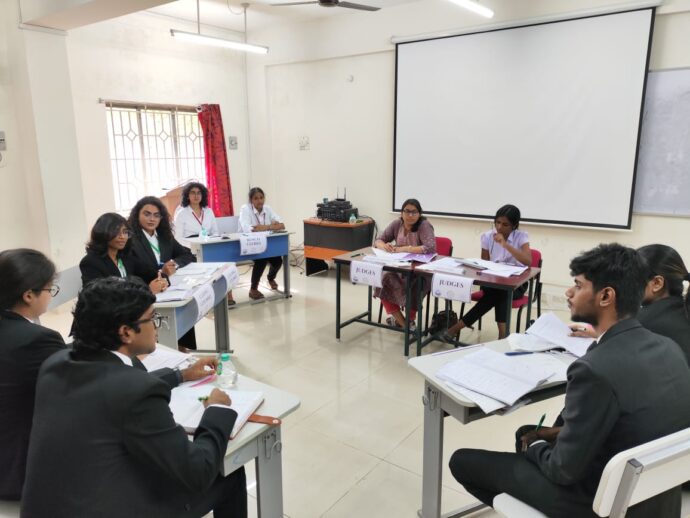
Following the introductions, the parties articulated their grievances and demands, with their respective counsels expounding on the technical and legal intricacies involved. The mediators then outlined the three agendas for negotiation, with the responding party advocating for the addition of an additional agenda.
A robust exchange of arguments ensued between the parties regarding the agendas, with each side endeavoring to persuade the other to concede to their demands. The mediators assumed an active role in guiding the negotiation process, individually engaging with each party to facilitate a consensus.
Despite exhaustive arguments on all agendas, the parties only reached an agreement on the issue of compensation, failing to reach a consensus on the remaining items on the agenda. The formal and structured mediation process highlighted the complexities involved in dispute resolution, emphasizing the importance of skilled mediation techniques in achieving mutually beneficial outcomes.
Court Hall-IX
The caucus session for the respondents commences with the mediators addressing the ongoing negotiation, and expressing concerns that progress has stagnated. The mediators urge the counsel representing the respondents to address this issue by proposing alternative solutions that can facilitate reaching a middle ground. It is conveyed that the respondents are prepared to offer a compensation of 12%. Following the exchange of demands between the parties, the counsel for Karpanai P Ltd. suggests the involvement of a Singaporean developer to enhance the project’s success.
Subsequently, discussions regarding share allocation ensue, with the respondents’ counsel explaining that such decisions must be deliberated by the partners of Karpanai P Ltd. and will be addressed in future sessions. Despite the petitioners’ demand for 15% compensation, negotiations proceed with counter-offers regarding the involvement of the Singaporean developer. Eventually, the counsel for the respondents agrees to the petitioners’ demands under the condition that the Singaporean developer is allowed to contribute to the development project.
Upon conclusion of the mediation session, the mediators commend the effectiveness of the proceedings and invite closing statements from both parties. Feedback is provided by the judges, Ujjwal Jain and T. Karthi, who suggest alternative methods that could have been employed by the mediators, such as emphasizing the resolution of share allocation percentages. The formal and structured approach to mediation underscores the commitment to achieving a mutually satisfactory resolution to the dispute.
Court Hall-X
The responding party has argued that constructing the commercial space would lead to a decrease in profits, advocating instead for the development of a commercial hub, which they believe would be more lucrative. However, they were requested to leave the mediation venue momentarily as they wished to discuss something emotional with the mediators in private.
In an attempt to find common ground, the responding party proposed offering two residential properties, but this offer was rejected by the requesting party. The mediators played a crucial role in simplifying the terms and conditions of various proposals, aiding in the negotiation process.
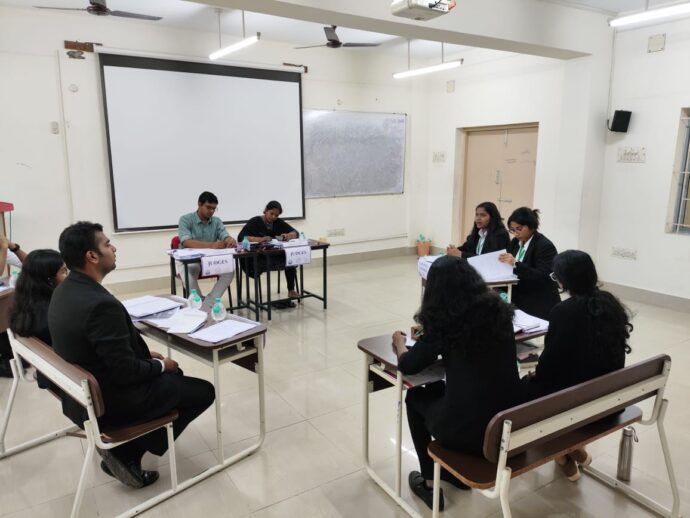
Despite the efforts of both parties and the mediators, a consensus could not be reached within the allotted time frame, leading to the suspension of the session. The mediators reassured both parties that they would continue to work towards finding a satisfactory resolution in future sessions.
Subsequently, the judges commenced questioning both parties, particularly focusing on the role and actions of the assigned mediators. This exchange of questions and answers between the parties and the judges ensued, shedding further light on the mediation process and the efforts made towards resolution.
ARBITRATION-
Court Hall-III
The arbitration rounds commenced at 4:45 PM in the presence of esteemed judges, Ms. Shweta P. Iyer and Ms. Shruthikka. The arbitrators introduced themselves and delineated the extent of their powers.
The petitioner party initiated the proceedings by providing an introduction and articulating the hardships and challenges faced due to the respondent party’s failure to adhere to contractual obligations. They outlined the agendas and issues to be argued by the counsel and co-counsel during the arbitration session.
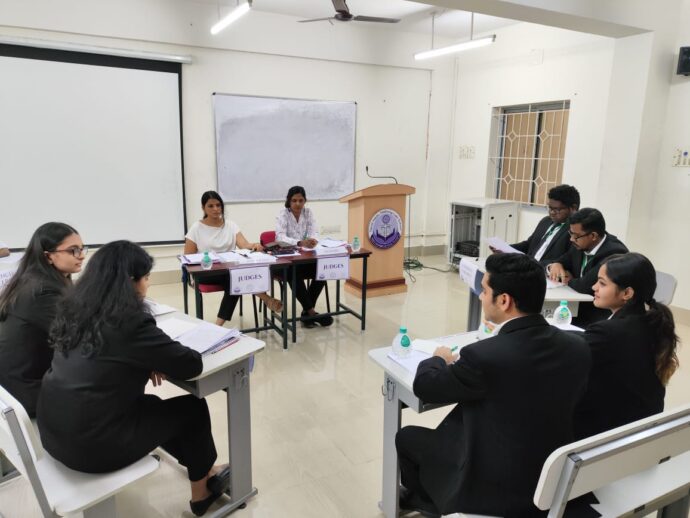
The counsels for the petitioner elaborated on the agendas, supported by references to pertinent statutes such as the Indian Contract Act and the Joint Development Agreement. They supplemented their arguments with recent case laws, focusing on issues pertaining to non-performance of the contract, force majeure, and the doctrine of frustration.
Subsequently, the responding party introduced themselves and presented arguments on the issues and technicalities of the case. They relied heavily on government notifications and case laws concerning force majeure and the doctrine of frustration, particularly in the context of the COVID-19 pandemic.
Throughout the proceedings, the arbitrators actively participated by posing questions to both parties during their arguments, as well as after the conclusion of their oral and written submissions. The formal and structured approach to the arbitration proceedings underscored the gravity of the dispute and the commitment to a thorough examination of legal principles and arguments presented by both parties.
Court Hall-IV
The counsels have allocated time among themselves to present their respective arguments. The claimant parties have emphasized the principle of equity, asserting their good faith in the matter, albeit hindered by inadequate communication. They have delved into the intricacies of the Indian Contract Act, specifically referencing Section 25, and bolstered their position with various case laws.
In response, the arbitrators have posed inquiries to the claimant parties, seeking further clarity. The claimant party has adamantly stated their entitlement to damages, attributing the breach of contract to the respondents. Their argument culminated with a formal prayer.
On the other hand, the respondent side has countered by alleging a violation of Section 16 of the Arbitration and Conciliation Act, and has brought forth Section 4 of the same act. However, arbitrators have noted attempts by the co-counsel to stray from the central issue. Furthermore, the respondent has cited a relevant case law involving the National Highways Authority of India (NHAI) to fortify their stance. They have argued against categorizing the pandemic as a force majeure event.
As the proceedings unfold, both parties are engaged in a rigorous exchange of legal arguments and interpretations, while the arbitrators diligently ensure adherence to the established framework of arbitration.
Court Hall-V
The arbitration proceedings proceed with intensity as the counsel representing the petitioner underscores the importance of time in commercial contracts. Referring to Clause 3.2.4 and Annexure A of the contract, it is argued that strict adherence to timelines is essential for the successful execution of the project.
Furthermore, the petitioner contends that even if time was not explicitly designated as essential, the respondents failed to notify Mr. Krishna within the stipulated 90-day period as outlined in the Joint Development Agreement (JDA). Reference is made to Section 73 of the Indian Contract Act, 1872, which discusses the entitlement of damages for the loss of future profits incurred due to Karpanai’s non-performance.
In response, the counsel for the respondents begins by addressing the tribunal members. They refute the notion that blame is solely attributed to Karpanai P Ltd., asserting the defense of force majeure. The following submissions are presented to defend Karpanai P Ltd.:
1. The delay is protected under the force majeure clause due to the impact of the coronavirus, as stipulated in the 11th Clause of the JDA.
2. The increase in application fees is also deemed a force majeure event.
The formal and rigorous exchange of legal arguments underscores the complexity of the dispute at hand and emphasizes the necessity for a thorough examination of contractual clauses and legal principles.
Court Hall-VI
The proceedings commence at 4:42 PM, with Mr. Arjun Sarvanan and Mr. Krishna Kumar presiding as judges. The arbitrators begin by introducing themselves and delineating the extent of their powers.
Counsels representing the requesting party invoke the Indian Contract Act, of 1872, questioning the opposing party’s failure to fulfill their contractual obligations. They substantiate their arguments with precedents and highlight the losses incurred due to the other party’s inability to meet their commitments. They assert that the opposing party was in breach before the onset of the pandemic and suggest that the pandemic is being exploited as a pretext.
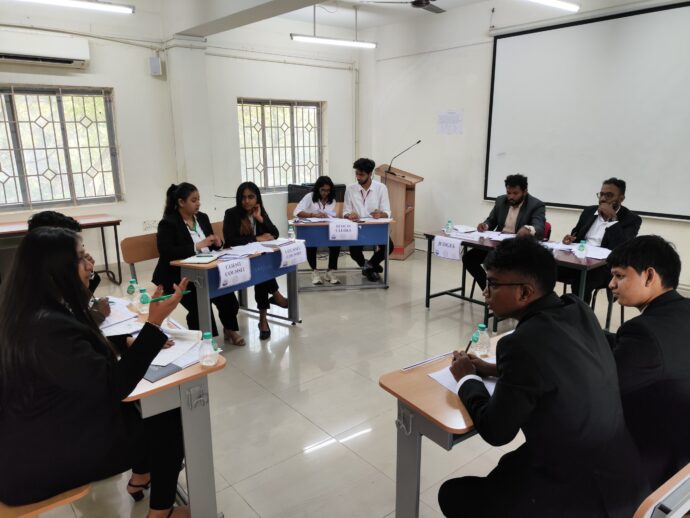
In response, the responding party acknowledges their inability to fulfill the contract but asserts the defense of an unforeseen event. They contend that they were not in breach before the pandemic but were incapacitated by its effects. The responding party refutes the allegations leveled by the opposing party and relies on precedents to support their position.
The formal and structured exchange of arguments underscores the complexity of the dispute and emphasizes the necessity for a thorough examination of legal principles and precedents.
Court Hall-VIII
The arbitration proceedings commenced at 5:00 under the auspicious presence of the esteemed judges, Ms. Deepika Sivakumar and Ms. Lydia Steffi. The arbitrators initiated the proceedings by delivering a brief introduction about themselves and outlining the extent of their powers.
The counsels representing the claimant side presented compelling arguments, asserting that the termination of the contract by the opposing party resulted in personal and financial losses, thus entitling them to compensation. Reference was made to several clauses of the Joint Development Agreement (JDA), and cases pertaining to ‘force majeure’ were cited to argue that despite the pandemic, the respondents could have taken steps to fulfill their obligations. The counsel supported their arguments with various case laws and statutes.
In response, the counsel representing the respondent side adeptly refuted the claims and arguments of the claimant side. Sections 55 and 56 of the Indian Contract Act were highlighted, along with provisions of the JDA, to argue against the claim for compensation. The counsel argued that the claimant party misinterpreted case laws and cited government orders and notifications, emphasizing the applicability of the force majeure and doctrine of frustration over the COVID-19 pandemic. Additionally, the jurisdiction of the arbitrators was questioned.
Throughout the proceedings, the arbitrators actively engaged with both parties, posing several questions regarding their oral and written submissions. Following thorough arguments and rebuttals, the proceedings concluded with the assurance from the arbitrators that an arbitration award would be issued.
Subsequently, the judges posed a series of questions to both parties, followed by feedback on the performance of both parties and the arbitrators. The formal and meticulous approach to the arbitration proceedings underscored the gravity of the dispute and the commitment to ensuring a fair and just resolution.
Court Hall-IX
The counsel on behalf of the petitioner draws attention to Sections 37, 73, and 75 of the ICA in front of the Tribunal and highlights that the development plan of the land must be as per the wishes of Mr. Krishna’s late parents and the failure of the respondents in carrying out the required duties would warrant the payment of damages to Mr. Krishna.
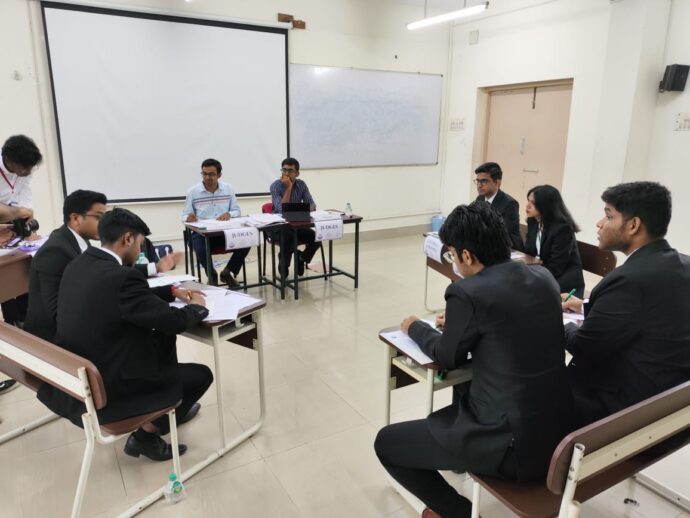
The counsel on behalf of the respondent reiterates the facts of the case and the timeline of the obstacles faced by Karpanai P Ltd and highlights paragraphs 2 and 3 of Section 55 in the Indian Contract Act. Even though the contract is voidable if there is non-performance of a party in case time was not held as of essence in the project, Entitlement of damages cannot be expected by the other party. Even before the announcement of the pandemic, The effects of COVID-19 still were in effect hampering the actions of the architectural firm and posing an obstacle in furthering the completion of the project, The counsel tries to prove that Covid-19 was an act of god and satisfies the requirements to be force majeure clause by pointing to subclause 11.1 of the JDA and with that the respondents state the claimant is not entitled to any compensation or damages.
The co-counsel assures the mediators that the respondents have done everything possible within their limits to fulfill their duties and Mr. Krishna is not entitled to compensation.
Court Hall-X
Both counsels have delineated the allotted time for the submission of their arguments. The claimant cited Section 56 of the Indian Contract Act, asserting that the respondent’s failure to invoke the force majeure clause was glaring. They argued that the foreseeable nature of the COVID-19 pandemic precludes its use as a defense, particularly as no notice was received regarding the activation of the force majeure clause.
Upon query from the arbitrator regarding citation 40 in their submissions, the claimant was requested to elucidate further. In response, the respondent contended that time is not of the essence in the contract, and highlighted COVID-19 as a possible act of God, detailing the logistical and managerial challenges faced. They referenced a relevant case involving ONGC to support their argument and emphasized the extension clause within the force majeure provision, indicating flexibility regarding contract timelines.
Subsequently, arbitrators posed several inquiries to the respondents, which were addressed comprehensively. The exchange of arguments and clarifications further illuminated the complexities of the case, as both parties navigated legal intricacies within the framework of arbitration.
After all the rounds had concluded, the arbitrators were once again asked to gather in the Language Lab for the drafting of the arbitral award.
And the Results are Out!
Teams that are qualifying for the Semi-Finals are-
Qualified Mediator/Arbitrator-
T-03
T-02
T-11
T-05
Qualified Client/Counsel(s) pair-
T-06
T-13
T-12
T-02
25th February 2024 (Day-3)-
10:30 AM | Semi Finals | UG Block
Semi-Final Round-1
MEDIATION
Mediation commenced with the mediator laying the groundwork, ensuring both the requesting party’s representatives, Krishna, and counsel Maya, as well as the responding party, were aware of the mediation process. Emphasis was placed on confidentiality and the procedural aspects, along with the establishment of ground rules.
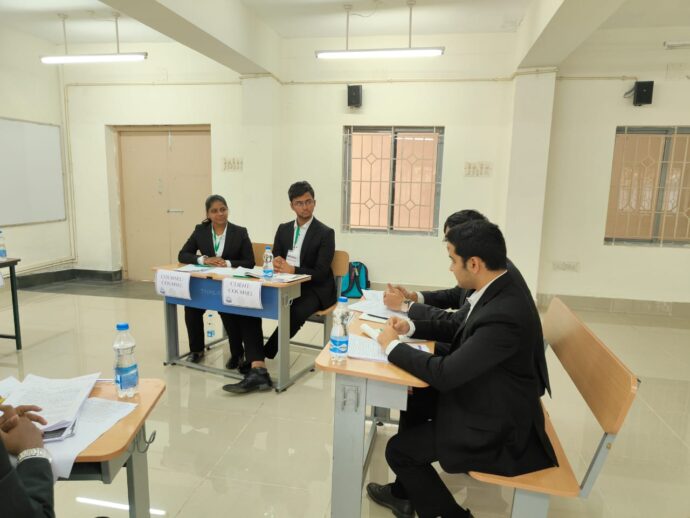
The requesting party expressed dissatisfaction regarding the Joint Development Agreement (JDA), citing lack of communication, and feeling marginalized in decision-making, resulting in diminished confidence. Counsel Maya confirmed Krishna’s authority to make decisions, proposing voiding the JDA and exploring options for a new contract or division of the residential apartment.
The mediator summarized the points raised, following which the responding party highlighted challenges faced, particularly due to COVID-19 and increased rates, expressing confidence in resolution.
Agenda setting ensued, focusing on amendments to the existing JDA or drafting a new one. Krishna sought clarification on past delays, attributing them to unforeseen operational issues exacerbated by the pandemic. Emphasis was placed on preventing future delays and increasing Krishna’s involvement, recognizing the emotional significance of the project’s residential aspect.
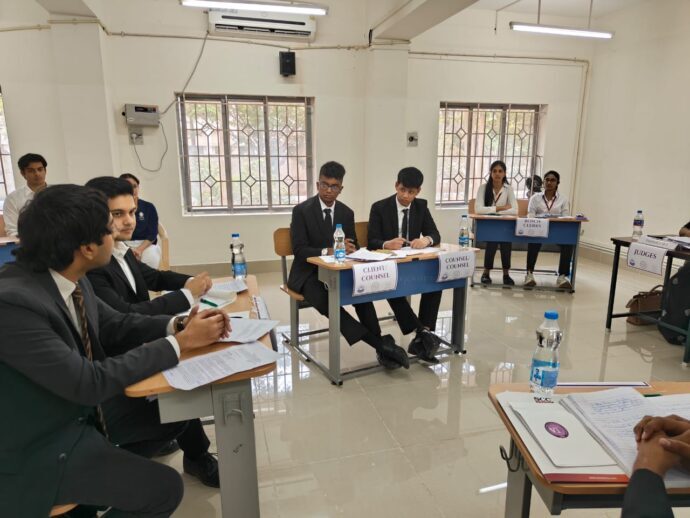
The respondent suggested the commercial conversion of the property, deemed mutually beneficial, although Krishna called for a caucus due to differing perspectives. Agreement was reached on a mixed-use model, with a predominant residential component (75%) and a commercial element.
Acknowledging the emotional investment, the respondent agreed to a reduced share in the commercial segment. However, they maintained the importance of a predominantly commercial complex.
The session concluded positively, with both parties expressing satisfaction in resolving initial concerns. Future mediation sessions were anticipated to address remaining issues, fostering confidence in further progress.
ARBITRATION-
The Arbitrator commenced by expressing gratitude to both parties for their participation in the arbitration proceedings, emphasizing the pursuit of a fair and equitable resolution. It was underscored that the contents and findings of the arbitration proceedings would remain confidential in accordance with the Arbitration Act.
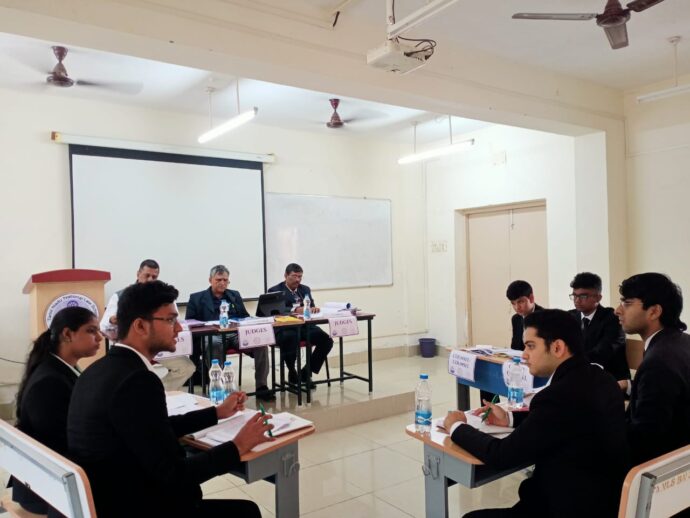
The Claimant presented the facts of the case, focusing on frustration and impossibility arising from Krishna’s signing of the Joint Development Agreement (JDA). The relevant clause of the JDA was elucidated, with contentions raised regarding the inability to cite multiple intervening events for delays, asserting time as an essence, and advocating for damages. The absence of a force majeure event was highlighted, invoking Section 32 of the Indian Contract Act to argue against delay, alongside addressing fee increases and the application’s associated costs. The absence of grounds for frustration was supported by pertinent Supreme Court precedents, with specific reference to page 15 of the factual matrix.
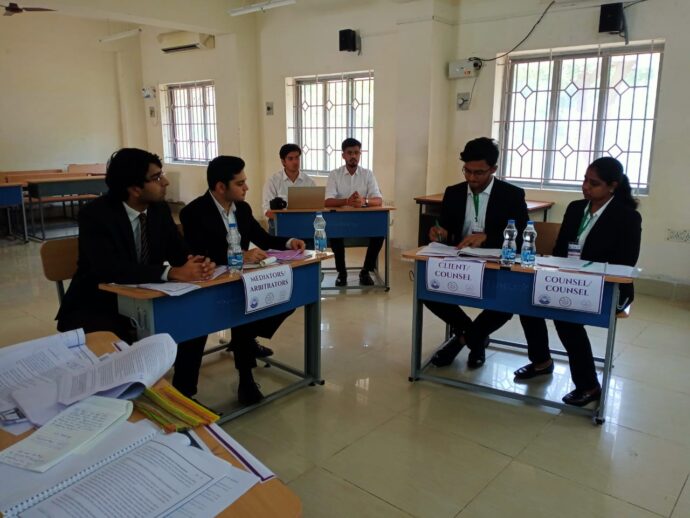
The Claimant’s counsel responded to the arbitrator’s query concerning reasonable control measures to prevent delays, asserting reasonable control and a timely approval process. It was contended that the delay in plan finalization, subsequent to additional seven months, was unwarranted. The initiation of the case to safeguard their interests was underscored, citing Section 56 of the Indian Contract Act. Regarding notice, it was affirmed that no intimation was received concerning delays, with the client lacking pertinent knowledge.
Section 55 was invoked to stress the essence of time, highlighting the gravity of loss incurred. The Respondents were deemed liable for compensation, with termination of the contract after a 90-day notice period sought under Sections 56 and 73 of the Contract Act. The Claimant sought a declaration of rightful contract termination.
In response, the Respondents cited Sections 8, 9, and 16 of the Arbitration Act, arguing the applicability of force majeure due to COVID-19 disruptions, supported by relevant case laws and Clause 9.1 of the JDA. The arbitration concluded with the Arbitrator thanking the parties for their contributions and adjourning the session.
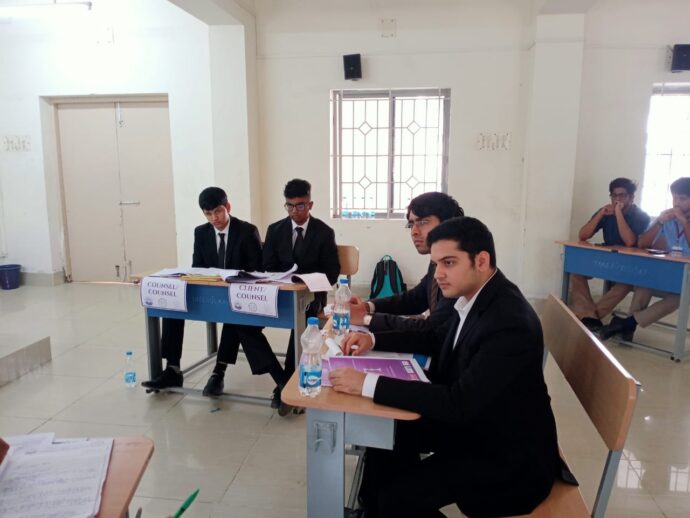
Following this, the Claimant submitted rebuttals, which were countered by the Respondents’ sur-rebuttal. The primary focus was on the sanction clause within the agreement, with the session concluding on a note of appreciation from the Arbitrator.
Semi Final Round-2
MEDIATION-
The mediation session commenced with M1 extending a warm welcome to all participants, setting the tone for constructive dialogue and mutual understanding. After introductions, M1 emphasized the importance of approaching the mediation process with an open mind, highlighting the mediators’ role as impartial guides towards a resolution. M2 then provided a detailed explanation of the mediation process, outlining key aspects such as confidentiality, the structure of the session, and the concept of caucuses. Throughout the session, both parties, represented by their respective claimants and counsels, presented their perspectives on the contractual dispute at hand, highlighting the challenges faced and desired outcomes.
As discussions unfolded, M1 facilitated the exploration of potential solutions, suggesting a focus on restructuring the Joint Development Agreement (JDA) as a feasible starting point. This proposition was met with agreement from both parties, leading to further deliberations on restructuring terms, compensation for losses, and the allocation of commercial and residential spaces. Despite differing opinions on certain issues, such as the division of commercial and residential areas, the parties engaged in constructive dialogue, demonstrating a willingness to find common ground.
However, as the session progressed, judges expressed concerns about the lack of assertiveness and depth in addressing underlying issues, urging for a more proactive approach from the mediators. They also highlighted the importance of cultural sensitivity and encouraged the parties to delve deeper into the cultural context surrounding the dispute. Despite these observations, the session concluded with agreements reached on expert appointments and the expansion of the residential area, underscoring the potential for collaborative problem-solving in mediation. Overall, the session served as a valuable platform for constructive dialogue and progress towards resolution, while also highlighting areas for improvement in future mediation efforts.
ARBITRATION-
The Arbitrator delineated the structure of the proceeding, providing a framework for discussion. The Claimant articulated their position regarding compensation and the arbitration agreement, seeking clarification on the final communication. It was asserted that the force majeure clause could not be invoked by the Claimant, drawing upon Section 56 of the Indian Contract Act and relying on key interpretations by the Supreme Court of India. A comprehensive research report on the architecture firm was duly considered, with a chronological exposition of events elucidating the gradual development of the case.
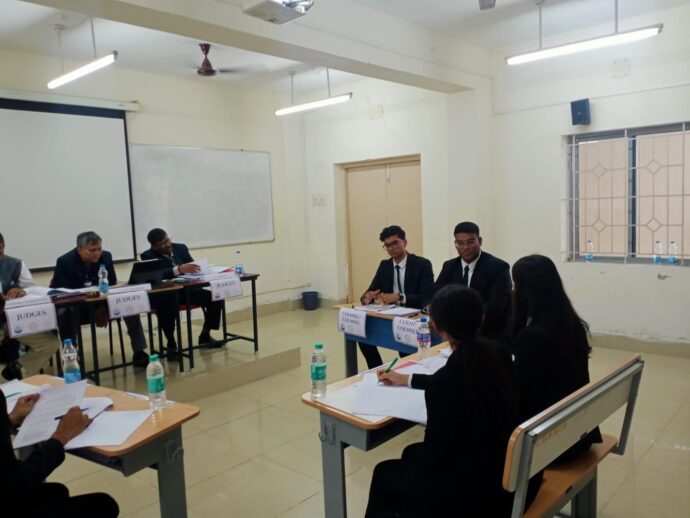
The contractual time stipulations were underscored, with the relevance of the Bombay High Court precedent emphasized. The Claimant stressed the imperative of holding parties accountable under the contract and securing damages, citing exceptions to the force majeure clause due to the lack of notice and elaborating on the interpretation of Section 56 by the apex court. The Claimant contended that the ban order, rather than COVID-19, was the primary cause of the delay, highlighting failures to rectify delays in February.
The Respondent countered by asserting a case of force majeure, noting the requirement for notice of a special fact, and elucidating on the automatic extension and 90-day curing period. The essence of the contract was deemed paramount, with no alteration observed in the agreement. It was argued that the impacted parties anticipated potential timeline adjustments, citing restrictions due to lockdown and limited access to the lead architect. The inability to inspect the construction site due to COVID-19 was underscored.
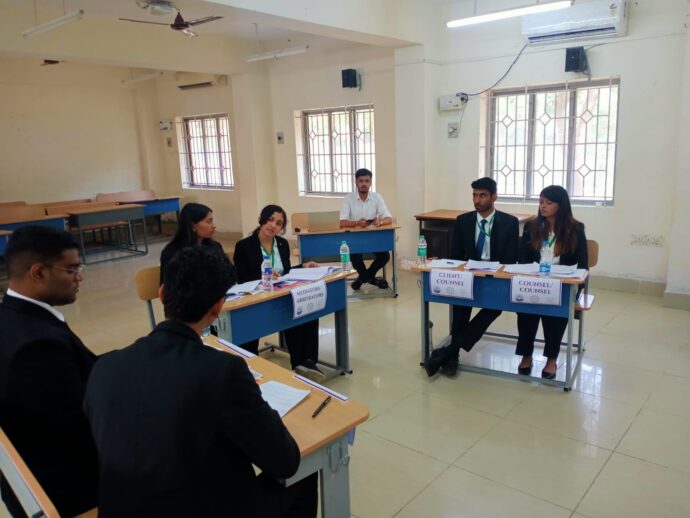
In response, the Claimant raised concerns regarding the unexplained delay on February 11th and questioned the interpretation of paragraph 13 of the proposition. The Respondent, in their sur-rebuttal, referenced Schedule 2 of the JDA, positing the directory nature of certain clauses and justifying fee increases as unavoidable.
And the results are out-
Teams that are heading towards finals are-
Mediator/Arbitrator-
T-02
T-05
Client/Counsel Pair-
T-12
T-13
4:00 AM | Finals | Seminar Hall-I
MEDIATION-
In the mediation session, the mediators initiated by inquiring about the parties’ authorities and thanked them for choosing mediation, emphasizing the collaborative nature of the process. It was underscored that the mediators would facilitate joint discussions while also allowing for caucus sessions, ensuring a voluntary and confidential environment with mutual respect.
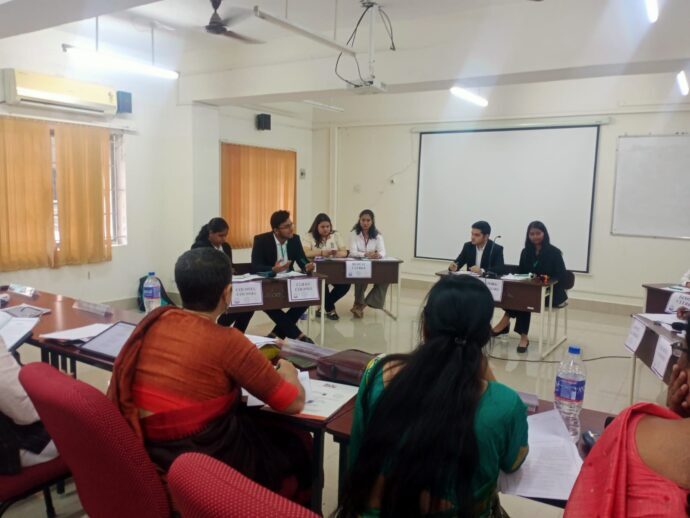
The requesting party expressed gratitude to the mediator and Mr. Jerald, highlighting the desire to foster a strong relationship moving forward. Concerns were raised about the incomplete Mithala project despite longstanding trust since 2019 and a vision for a win-win outcome to preserve the Joint Development Agreement (JDA) with necessary modifications. Solutions were sought to address a significant increase in plant sanction and other project-related challenges.
Mr. Jerald extended condolences for the passing of Krishna’s parents and reiterated the commitment to continue the JDA, emphasizing shared goals and interests in realizing the Mithala project. Agenda setting ensued, focusing on redrafting clauses, consolidating lands, and proposing joint construction to circumvent regulatory issues. Timeline estimates were requested by Krishna, with assurances from Mr. Jerald regarding financial commitments and proper contract drafting to address future challenges. The responding party sought a caucus to discuss the continuation of the JDA, land acquisition, and renegotiation of commercial and residential spaces, considering property contingencies. The need for caution in providing assurances was highlighted in case of unforeseen circumstances.
The mediator suggested finding middle ground and ensuring ongoing communication between the parties. Mr. Jerald expressed willingness to accommodate Krishna’s increased role and agreed to discuss retaining units in the new development project. Both parties expressed satisfaction with the fruitful session.
Overall, the mediation session progressed with a formal exchange of ideas, focusing on constructive dialogue and collaboration to address the parties’ interests and concerns regarding the Mithala project.
ARBITRATION-
The arbitrators commenced by providing their introduction and delineating the jurisdiction conferred upon them by the Joint Development Agreement (JDA). They elucidated the essence of their role and the arbitration process.
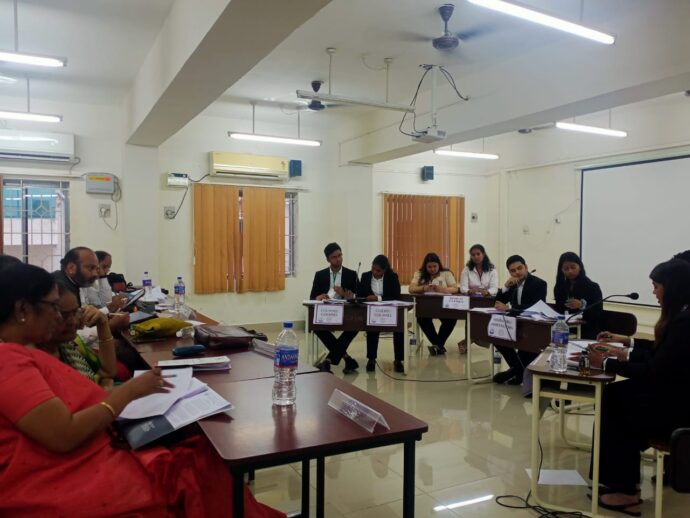
The claimants were allowed to present their opening statements and arguments. They meticulously outlined the jurisdictional aspects of the dispute and provided a succinct overview of the facts, emphasizing the breach of the JDA as the crux of the matter. Three primary issues were delineated:
1. Whether COVID-19 constitutes a force majeure event – The claimants advanced arguments asserting that the force majeure event preceded the breach and did not cause it. They contended that there has been a continuous breach, supported by authoritative cases from the Supreme Court.
2. Whether the increases in bank sanction and the imposition of a height restriction constitute a policy change – The claimants asserted that the height restriction is not tantamount to a banning order and does not render the contract impossible to perform. They cited the Suez Canal Force Majeure COVID-19 case as a precedent.
The respondents then provided a brief overview of their position and commenced their opening statement. Their first submission pertained to COVID-19 and the force majeure nature of the event. They addressed concerns regarding notice and argued that the construction contract, while broadly commercial, falls within a special category where time is not deemed essential.
7:00 PM | Valedictory | Multi-Purpose Hall
The Winners and Runners-up of the VI TNNLU National Med-Arb Competition are-
Winner Client-Counsel Pair-
National Law School of India University, Bangalore
Runners-up Client-Counsel Pair-
Indian Law Societies’ Law College, Pune
Winner Arbitrator/Mediator-
O.P. Jindal Global Law School
Runners-up Arbitrator/Mediator-
National Law University, Jodhpur
Best Arbitral Award-
O.P. Jindal Global Law School
Best Memorial-
National Law University and Judicial Academy, Assam



